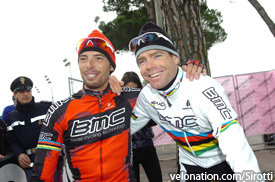Four years ago Swiss entrepreneur Andy Rihs ran the gamut of emotions as a team owner in the sport of cycling. At the end of July he was on top of the world after winning his first Tour de France title with Floyd Landis, and then, just four days later, news of a positive result for testosterone saw the American, along with Rihs’ Phonak team, disappear from the sport.
While Rihs could have done without the drama that ensued, the circumstances weren’t enough for him to lose his passion for cycling. In 2007 he set his focus across the pond to America, and created the BMC Racing Team along with American cycling stalwart Jim Ochowicz as a way to promote his line of high end bicycles. From there, Rihs continued to build the team with former Phonak Directeur Sportif John Lelangue at the helm, eventually gaining invitations to race in Europe at the Tour de Suisse and several races in Belgium in 2008.
Last year saw the team take to the streets of Europe again, and this time they received a wild card invitation to ride in Paris-Roubaix. Even though the team’s best finisher, Swiss Alexandre Moos, finished several minutes behind winner Tom Boonen, an appearance at the big show seemed to set the wheels in motion for some transfer revelations in the Fall.
“It was really a very difficult time back then,” Rihs told Schweizer Fernsehen about his ordeal in 2006. He took it slowly at first with the BMC Racing team, and came out swinging late last year, taking on newly crowned World Champion Cadel Evans, former World Champion Alessandro Ballan, US National Champion George Hincapie, Dutchman Karsten Kroon and German Marcus Burghardt. He says his motivations to get back into the sport are clear cut.
“The reason why I return to racing now is purely for commercial reasons,” he said. “It is the business!
“We produce the BMC bikes, which we export all over the world. I have to admit we sell many of the bikes because of the racing. People want to ride the bikes of the winners, which is the same way in competitive skiing [wanting to use the same skis].”
While it’s clear from his signings that Rihs wants to compete at the highest level in the sport, he isn’t too concerned about the official designation given to the team. “Not necessarily,” he said about trying to gain entry into the ProTour. “It isn’t a requirement to be a ProTour team to get into the important races. At this time BMC has been nominated for virtually all of the major races, such as for the Giro d’Italia and the Vuelta [a Espana].”
Rihs knows it will be a waiting game when it comes to cycling’s biggest race: “With the commitment of Cadel Evans we have automatically become a candidate for the Tour de France. We can’t do anything about it from our side. The organizers will make the decision on who will be the participating teams.”
 He has confidence that his general classification rider will be the team’s ticket into the Grand Boucle: “But with Evans, the reigning world champion on the road, we really have a strong argument on our side. He belongs on the list of favorites at the Tour de France. The decision [on whether they receive a wild card] will be taken in the coming days.”
He has confidence that his general classification rider will be the team’s ticket into the Grand Boucle: “But with Evans, the reigning world champion on the road, we really have a strong argument on our side. He belongs on the list of favorites at the Tour de France. The decision [on whether they receive a wild card] will be taken in the coming days.”
One doesn’t get the sense that Tour de France organizers, the Amaury Sports Organization, are harboring any ill feelings toward Rihs after Landis’ disqualification. He appreciates the changes that have been made over the last several years to clean up the sport, yet is realistic about the fact that a positive doping result is possible for any team.
“I think that that cycling is heading in the right direction, which is not the case in all sports. But it is clear you never have any guarantees [that a rider will stay clean]. But if a rider is caught now, then his career is almost over. Five or six years ago, that was not the case. The controls are very targeted, and they now monitor over long periods [of time], and it is really very difficult to slip through the cracks of the network [of anti-doping controls].”
He points out Spain and Operacion Puerto scandal as a serious problem with respect to doping: “I cannot confirm that,” he replied when asked if he would exclude Spanish riders from the team. “But it is a difficult matter as long as the Spanish government refuses to cooperate in the fight against doping. Currently, we are not looking for any Spanish riders.” He feels the fact that, aside from the cyclists, the Puerto case was ignored, sends a strong message about the situation.
When it comes to bringing more Swiss riders onto the team, he was asked about the country’s biggest talent, time trial World Champion Fabian Cancellara. Cancellara has another year on his contract with the Saxo Bank team, but if Bjarne Riis can’t find a replacement sponsor for next season, he could be fair game. “I can’t tell you what we are planning,” Rihs admitted. “He is on the list of riders we would be happy to sign. The goal [for the team] is to have a mixture of Swiss and Americans and riders from other Nations, which form a homogeneous team.”